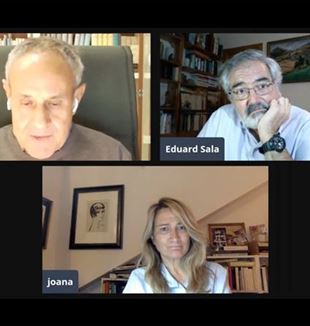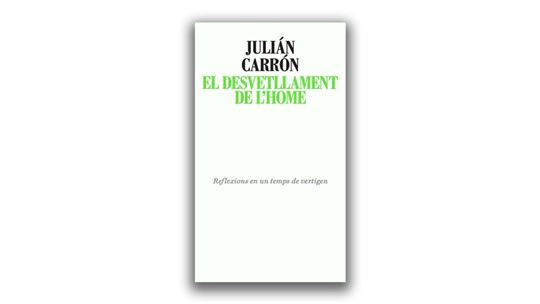
Barcelona: “Either orphans or children”
While infections in Spain are rising, journalist Joana Bonet and Eduard Sala, of the local Caritas, presented the Catalan edition of "Reawakening Our Humanity" alongside Julián Carrón. "Are you really saying that this reality is not an obstacle?"The saying goes that man is the animal that stumbles twice upon the same stone. Eduard Sala, head of Social Action of the Diocesan Caritas of Barcelona, lamented man’s forgetfulness on October 1, during an online presentation of El desvetllament de l'home, the Catalan translation of Awakening Our Humanity, in which Julián Carrón addresses some of the most urgent issues raised by the pandemic. "Questions we ask ourselves in difficult moments, and then we stop asking ourselves," stressed Sala. "This book puts us in front of a terrible fragility. During confinement, everything was suspended, everything was shattered and we were left alone in the middle of the desert. When we could do nothing, we wondered what the first thing we would do would be when we were able to go out again, and the answer never coincided with the routine tasks in our daily schedules. This brought out what sustains me when everything around me falls apart, but that we take for granted when life goes back to being "normal".
On a small screen next to Sala, appeared the face of journalist and writer Joana Bonet, who pointed out that "the impact of reality makes you see that those questions have always been there, but we did not want to look for answers because the everyday, the vortex, the getting carried away by the daily urgencies, often hid what was important." Our society has been pervaded by a sense of omnipotence and has clung to dying values such as money, success.” Faced with this impact, Joanna Bonet read the book and was impressed by the many authors she met, two of whom had a special impact on her. "I was struck by a phrase by Giussani, when he says that the only condition to be truly religious is to live the real intensely. This irruption of reality forced us to reflect, each one of us took refuge where we could: in our faith, in our ideas, but always trying to feed that fragility that the book reflects.” And the second quote that the journalist highlighted is a question from Carrón who - she assures - continues to provoke her: "Are we suffocating, or are we surprising ourselves with how free we are?”
"We can only be free if we live the real intensely, if we do not stop at appearances," noted Carrón. "It is not that money, success, enjoying life are negative things in themselves, but they are questioned when life puts you on the ropes. So you see if that is all there is or if there is something else that you used to take for granted because you stopped at the surface. This concept of religiosity is not for the most devout, but describes the challenge that reality throws at all of us, with all our need for meaning. It is the way to unite things that would otherwise appear separate."
At this point, Eduard Sala accepted Carrón's challenge and put Carrón’s questions back to the author, challenging him to help him understand how it is possible that every circumstance of reality can be an opportunity to respond to man's desire, even more so in such a dramatic moment. During confinement, Sala was unable to stay at home for a single day, as there were countless dramatic requests for help that came to Caritas continuously. He expressed it in this way: "Saying yes to a God that is present, who does not resolve what is happening is very shocking for me. I am bewildered by the yes you propose and the provocation that such a terrible reality can be the place and the way God calls me. Are you really saying, Julián, that this horrible reality is not an obstacle? And do you really build the world equally by staying at home, or by fighting in hospitals, or by distributing food to the most needy? These provocations shake me up, they are questions we do not normally ask ourselves. They are the kinds of questions you ask yourself, at most, on the way to the cemetery. Is my life worth it, what are my priorities? This book gives you a good shake, it is like a slap."
Carrón’s response appealed to his personal experience. "One of the points of no return in my life was when I began to realize that the circumstances I saw as obstacles could actually be opportunities. They did not prevent me from walking, but they challenged me to take steps in life, and so they made me grow. If I had not used those circumstances to mature and become more familiar with reality and the Mystery, I would have missed half of what happened to me in life. Learning these things changes your life, because then what happens, instead of being disposable, something you have no choice but to endure or suffer, becomes a brick that builds your life. So nothing is disposable: neither those who are at Caritas, nor those who are locked up in their houses with their yes.
Carrón spoke of a woman with ALS who complained about her situation because she could do nothing to help her children and grandchildren, not realizing how much life she was generating around her with her simple yes in accepting and living this terrible disease. "With the joy with which you see her living this circumstance, she is challenging us all, including her children and grandchildren. They go to see her smile as if they were going to her house on pilgrimage. It seems like nothing, but people go to see her because after seeing her they find themselves more capable of facing their own situation, which is infinitely less heavy than the ALS this woman is suffering from, who can only move her eyelashes. This yes, which seems useless, is the most decisive yes. Giving meaning is no less precious than giving food."
Sala began to list some of the dramatic situations encountered during the pandemic, not only to report terrible contingencies that hurt him deeply, but also to learn to look. "When you are assisting vulnerable people who cannot take for granted everything we take for granted, you are faced with their question about why, and why me. They ask you many questions if you know to look. The question is not ‘how are you?’ but ‘how are you really?’ That ‘really’ is in Julián's book and in reality, like a kick in the chest, if you know to look."
Joana Bonet also emphasised this point. "Now in Madrid we are confined again, we go back to the window to look at the sky. We thought we were back to normal, but was what we were experiencing normal? A clinical society, where so many things are disposable, with a galloping dehumanization." The columnist of La Vanguardia recalled the image used by Pope Francis, saying that now we are all in the same boat. "Now belonging is more important than ever. I perceive that we live on two levels: the macro and the micro. And in the micro I see how the social fabric strengthens around me, we must be a balm for others, take care of ourselves, help each other look for answers together. As Jesus said in last Sunday's Gospel, publicans and prostitutes pass us by in the kingdom of God." A search tinged with pain and sometimes fear, which was not spared to Jesus Christ himself, as Bonet herself emphasized, echoing Jesus' words on the cross: “’My God, my God, why have you forsaken me?’ With the pandemic, the soul has begun to emerge. Reality rebelled, as González Sainz says, and the more reality impacts, the more reason opens up. At this point in the book, Julián connects reason and Mystery, a theme that I find fascinating.”
Read also – “Fratelli tutti”. Pope Francis’ encyclical letter
"The most surprising thing is that God does not spare this abandonment even to his son," Carrón answered in relation to Joana's quote: "Sometimes we consider Jesus as a hero, but he was not spared anything of his Passion, it was not fiction. How can one live such a thing? This circumstance can last a long time, the question is not how long it will last, but what allows us to be fearless in the face of uncertainty. Like Jesus, what allows us to live this circumstance? He was able to live it thanks to the relationship he had with the Father. And we can either live as orphans or children. It is not a problem of heroism, as if we had to draw strength from weakness, which we do not have. It is an opportunity to realize that we can live as orphans, but in reality we have a Father. And life could be totally different, as it was for Jesus, even if he was spared nothing. Without this we cannot build. We will not be able to build our people and much less our society."